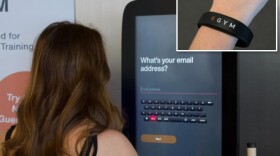TALLAHASSEE – A federal judge on Friday criticized Gov. Ron DeSantis and the state's senior higher education appointee for "running their mouths" with directives for two universities in Florida to shut down chapters of pro-Palestinian student organizations.
The judge did not immediately issue a protective order covering the chapters of the Students for Justice in Palestine as they had asked.
In remarks at the end of a nearly four-hour hearing in Tallahassee, U.S. District Judge Mark Walker emphasized that words have consequences. The judge was referring to an Oct. 24 memorandum from Ray Rodrigues, chancellor of the State University System, instructing that the University of Florida and University of South Florida "must" deactivate the student groups after the Hamas surprise invasion of Israel in the fall.
Before he abandoned his presidential campaign last week, DeSantis had also boasted during one of the Republican debates in November that he had already shut down the pro-Palestinian student chapters. In fact, the two universities had quietly consulted outside lawyers over the directives from Tallahassee who told them the moves would be unconstitutional. The schools asked the administration what to do next but otherwise took no action.
"All kinds of people at all levels of government running their mouths,” said Walker, appointed in 2012 by President Barack Obama and who has regularly criticized DeSantis and his administration in his rulings on voting and civil rights cases.
The judge said it was notable that students were at the heart of the case and it was significant to see young people engaged like this.
The judge deferred ruling in the case until an unspecified future date.
Lawyers for the student groups had asked Walker to temporarily block the DeSantis administration’s efforts to deactivate them. They sought a preliminary injunction that would protect their continued activities on campuses.
Meanwhile, lawyers for DeSantis and the State University System asked the judge to throw out entirely the groups’ lawsuits, which assert that their First Amendment rights were being trampled.
The DeSantis administration had objected to a statement of support from the groups’ national parent organization that it was “part of” the resistance against Israel. Florida said that violated a state law against offering material support to terrorists. Legal experts said the order was almost certainly unconstitutional. They said those terrorism laws don’t prohibit independent advocacy or expression but outlaw specific conduct that includes expert advice or assistance.
In court papers, lawyers for the governor said there was no evidence that DeSantis personally directed Rodrigues to order the groups to shut down. They said the governor "did not, and could not," issue the controversial memo. His lawyers called it "allegedly unconstitutional conduct."
In Friday’s hearing, the judge appeared to agree that the governor's involvement was peripheral. He asked lawyers for the students whether they were asking him to order DeSantis "to stop talking."
Meanwhile, lawyers for Rodrigues said the groups failed to adequately identify the specific First Amendment protections they said he violated with the order to deactivate them. They also said the universities were allowed to ignore the memo, which they said had no legal effect. The board of governors had no enforcement authority over student groups, they said.
After the hearing, Brian Hauss, an attorney for the student chapter at the University of Florida, said the best evidence that showed pro-Palestinian students were afraid was the fact that Rodrigues’ deactivation order has not been rescinded.
“We asked whether defendants would commit not to enforcing that order, and after we asked that question, defendants rested on their papers,” he said. “They would not and continue to refuse to disavow that order.”
Walker noted the universities hadn’t taken any steps to comply with the memo.
“This would be an entirely different case if you had folks at the university level telling [student groups] to back off,” Walker said.
DeSantis notably made his support for Israel and stance against pro-Palestine student groups a big part of his GOP presidential campaign — before he dropped out after losing badly to former President Donald Trump in the Iowa caucuses.
“We had a group, Students for Justice of Palestine. They said they are common cause with Hamas. They said, ‘We’re not just in solidarity. This is what we are.’ We deactivated them,” DeSantis said at the Republican presidential primary debate in Miami in November.
Friday’s hearing comes after months of back-and-forth between the state, universities and their students after the October memo from Rodrigues.
Rodrigues disclosed in November that the universities chose not to comply with his memo to deactivate the student chapters, based on the advice of outside lawyers the schools hired. The legal opinions the schools sought warned that campus officials could face personal liability for following the governor’s orders, he said.
For now, exactly what lawyers told university administrators in those legal opinions remains a mystery.
The University of South Florida this week declined to turn over a copy of its legal guidance under Florida’s public records law, citing a provision that allows government agencies to withhold the work product of its attorneys.
The University of Florida has ignored requests submitted under state law for the same legal guidance from its outside lawyers for the past 11 weeks. It did not respond to messages earlier this week asking why it was taking so long to turn over the legal opinion or explain why it believed it was entitled to keep it secret.
This story was produced by Fresh Take Florida, a news service of the University of Florida College of Journalism and Communications. The reporter can be reached at clairegrunewald@freshtakeflorida.com. You can donate to support our students here.




